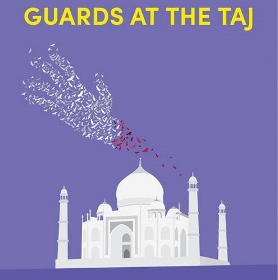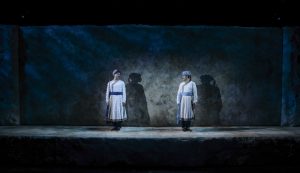BEAUTY AND BLOOD
Guards at the Taj is, in the very best sense, unavoidable. To appreciate this grim and great drama by Rajiv Joseph (Bengal Tiger at the Baghdad Zoo, The Lake Effect), it helps to recall the facts that inspire it: The Taj Mahal means “Crown of the Palace,” but this magnificent marble mausoleum and its formal gardens — located in Agra, on the south bank of the Yamuna River — is much more. Built between 1632 and 1648, this Indian edifice may well be the most beautiful building on the planet (however currently threatened by pollution and its own popularity).
Visited by an amazing 8 million tourists per year, it remains the repository commissioned by Mughal emperor Shah Jahan for his favorite wife, the Persian princess Mumtaz Mahal, mother of his 14th child. At a contemporary cost of $827 million, this perfectly proportioned and sumptuously appointed resting place — now one of the seven modern wonders of the world — was built over 22 years by 20,000 Hindustan artisans.
 Fanciful with facts but beyond generous in imagination, Joseph’s 2016 Obie winner, now in a splendid Chicago premiere by Steppenwolf Theatre, works on many levels — as a metaphor contrasting mortality with perfection, a psychological portrait of conformity versus creativity, and a critique of today’s value-free aesthetic. Above all, it delivers a searing and topical take on the interplay of cruelty and beauty.
Fanciful with facts but beyond generous in imagination, Joseph’s 2016 Obie winner, now in a splendid Chicago premiere by Steppenwolf Theatre, works on many levels — as a metaphor contrasting mortality with perfection, a psychological portrait of conformity versus creativity, and a critique of today’s value-free aesthetic. Above all, it delivers a searing and topical take on the interplay of cruelty and beauty.
Covering two tumultuous days, this alternately hilarious and repellent 80-minute one-act centers on Humayun and Babur, two captivatingly contrasted soldiers. It is dawn in 1648 and these impeccably attired imperial guards face south, away from the protective wall that has shielded the Taj Mahal from the curious public. (Today is its grand opening: Excitement, as much as the sound of bird calls, hangs in the air.) Forbidden to gaze upon this hidden treasure, these childhood chums pass the time in small talk that aptly delineates their crucial differences.
Religious, dutiful, and conservative, Humayun (Omar Metwally), the son of a prominent general (whom he secretly loathes), prides himself on his martial vigor: He glories in his fidelity to sacred oaths of obedience to his king. Arriving characteristically late to duty, the easily flustered Babur (Arian Moayed) is much less conventional: Curious and sensitive, this young veteran is a questioner and a hopeful inventor of such oddities as a “flying palanquin” (which would require “seatbelts” for its passengers’ safety). Later, taking up the game, Hamayun conjures up transportable holes (but can’t fathom the bags that could carry them); Babur in turn envisions colored rain with tea and alcoholic flavors.
Though ordered to be silent, the bored duo chatter away with a deadpan delivery of vaudevillian patter and circular illogic that instantly recalls Beckett’s bums “Didi” and “Gogo”: They share a hope to be posted to higher responsibilities, especially the tempting possibility of salacious sentry duty in the emperor’s harem. They recall a soon-to-be-strategic boyhood memory of spending a night in a tree fort made of sandalwood to repel insects. They gossip about the Taj, with its turquoise from Tibet and lapis lazuli from Afghanistan, and its architect, who has supposedly been forbidden to design anything more to rival his last triumph.
 When they finally sneak a peek at the Taj itself, these mere mortals are struck dumb by its almost lunar perfection. The sight incites Babur: He offers prescient thoughts about the power and persistence of beauty. Suddenly, more than for the Emperor or even Allah, Babur has a new wonder to worship and, perhaps, to kill and die for.
When they finally sneak a peek at the Taj itself, these mere mortals are struck dumb by its almost lunar perfection. The sight incites Babur: He offers prescient thoughts about the power and persistence of beauty. Suddenly, more than for the Emperor or even Allah, Babur has a new wonder to worship and, perhaps, to kill and die for.
But, mid-play, all idle conversations end abruptly and the play’s tone changes completely: These tools of the Emperor are caught up in and forced to perform a horrible atrocity (based on one of the many myths about the Taj). With the same hubris that Chinese emperor Qin Shi Huang lavished on thousands of sacrificial terracotta soldiers and his  Great Wall, Shah Jahan indulges in a grotesque endeavor to ensure that nothing more beautiful will ever surpass his timeless tomb.
Great Wall, Shah Jahan indulges in a grotesque endeavor to ensure that nothing more beautiful will ever surpass his timeless tomb.
By play’s end the friends’ loyalty is tragically tested by the fearful prospects of blasphemy and treason. For the rest of his life, the bird songs that Hamayun will hear outside the wall will mourn the mausoleum for very different reasons.
Perfectly shaped by Steppenwolf ensemble member Amy Morton, Guards at the Taj is a splendid showcase for its original actors. Metwally superbly suggests Humayun’s conflicts between compassion and control. Ironically, his stoic stance reveals just how much inner life this unloved son has had to repress. A dreamer in the wrong uniform, Moayed’s Babur, for all his contagious remorse, represents a kind of secular salvation. But his new devotion to beauty is far from priceless.
It’s astonishing how persuasively Joseph’s gorgeous script casts its spell: Crafted with contagious warmth and wisdom, it brings its own beauty out of the appalling ugliness of its central situation. After seeing this show, you wonder if there’s anything that theater can’t do.
Guards at the Taj
Steppenwolf Theatre Company
Steppenwolf’s Upstairs Theatre, 1650 N Halsted St
ends on July 22, 2018
for tickets, call 312.335.1650 or visit Steppenwolf
for more shows, visit Theatre in Chicago








{ 1 comment… read it below or add one }
Thanks for this beautiful review of one of the season’s best